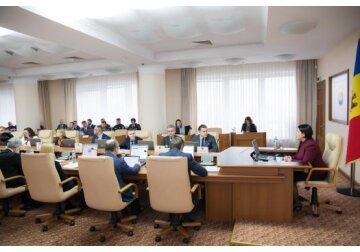
The government approved the draft tax and customs policy for 2023.
According to the draft, next year there is no increase in personal exemptions for citizens, exemptions for dependents, etc. At the same time, it is proposed to return to a progressive income tax rate - citizens with incomes of more than 1 million lei will pay 18% of their income to the budget. Employees of ICT parks and employees of the trucking industry in taxi mode will be able to qualify for a personal exemption in a general manner. It is planned to revise the concept of taxation of income of small and medium-sized enterprises: in 2023-2025 a zero tax rate on SME profits will be applied, provided that it remains undistributed. This measure will not apply to SMEs from the financial sector. The project also provides for the implementation of a mechanism for the return of VAT accumulated on the accounts of economic agents, and for large enterprises an investment-oriented method of depreciation of fixed assets in the first year of use will be introduced. Starting next year, the nominal value of a food voucher for one working day, deductible for tax purposes, will increase from 55 to 70 lei instead of the current 35 to 55 lei. According to the draft, the validity of patents for retail trade from stalls, counters, tents, kiosks (stalls), pavilions and cars, as well as the sale of perishable domestically produced food products can be extended until July 1, 2023. It is proposed to revise the principles of taxation of non-residents and the regime of taxation of income on interest paid in favor of resident individuals. Some VAT exemptions will be abolished: for postal services (excluding services for the distribution of pensions and social benefits), electric scooters, import and supply of certain categories of transport, operating or financial leasing services for aircraft, import and supply of ferrous and non-ferrous waste metals. Manufacturers of perfumery and cosmetic products will be deprived of exemption on payment of excise duty. At the same time, the introduction of the reverse taxation regime and the transfer pricing mechanism will begin (from 2024). Maximum and specific real estate/land tax rates will be eliminated to allow local governments to plan these tax rates every 3 years. It is planned to increase from 1.5 million to 2 million lei the estimated value of residential real estate (one of the criteria for assigning a tax), the owners of which pay "property tax" called in the people the "Luxury" tax. It is proposed to introduce a toll for the use of a public road zone and / or a protected zone outside the perimeter of settlements for the placement of objects for the provision of road services, etc. The Ministry of Finance revised the provision on increasing the income tax rate, which is levied on deposits of individuals - instead of 12%, as the project originally envisaged, it is proposed to tax deposits at a rate of 7% (today - 3%). Also, the Ministry of Finance did not support the position of representatives of the tobacco industry, who spoke out against the acceleration of excise policy: the project provides that in 2023 excise rates on tobacco products and similar products will increase by 25%. Excise taxes on ethyl alcohol in 2023 will increase by 15%. In general, the bill provides for changes to more than 20 laws and regulations. It is expected that the impact of the proposed changes will be neutral, and the amount of additional revenues to the budget will be almost equal to the amount that is not received by the budget. The bill must be approved by Parliament. // 07.12.2022 — InfoMarket







